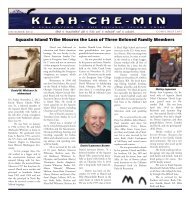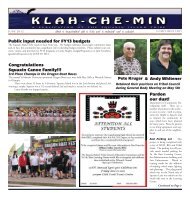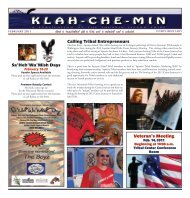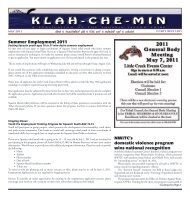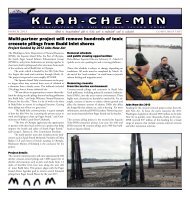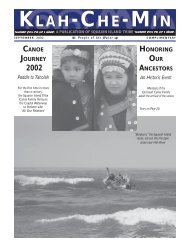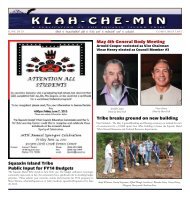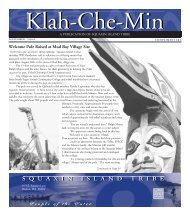Canoe Journey Guidebook - Squaxin Island Tribe
Canoe Journey Guidebook - Squaxin Island Tribe
Canoe Journey Guidebook - Squaxin Island Tribe
Create successful ePaper yourself
Turn your PDF publications into a flip-book with our unique Google optimized e-Paper software.
ation of the Fourth of July. <strong>Squaxin</strong><br />
<strong>Island</strong> <strong>Tribe</strong> was giving a ceremonial<br />
Potlatch. They knew the non-Indians<br />
wouldn’t bother them during an<br />
American celebration, the Fourth of<br />
July. The Potlatch ceremony was so<br />
important to our people, that they were<br />
willing to risk the possibility of going to<br />
prison.”<br />
In November of 1881, at 40 years of<br />
age, John Slocum operated a small<br />
logging camp on Skookum Inlet. He<br />
was killed in an accident in the woods<br />
and his two half-brothers paddled to<br />
Olympia for a casket. John’s wife, Mary<br />
was so overcome with grief that she<br />
walked to a nearby creek praying and<br />
crying. As she prayed, a tremor came<br />
over her and her body began to shake.<br />
She returned to where her husband<br />
was laid out and she reached over her<br />
deceased husband with praying trembling<br />
hands. Eventually John sat up and<br />
began to speak. He said he had been to<br />
a place of bright light and that God had<br />
sent him back to life with a message for<br />
the Indian people to believe in the man<br />
named Jesus.<br />
John Slocum’s new church combined<br />
Christian and traditional beliefs. For<br />
example, candles replaced the smudging<br />
with sacred tobacco kindled in large<br />
shells. Shakers use the candles to “light<br />
you up and strengthen the spiritual<br />
path.” Hand-held bells replaced handheld<br />
drums.<br />
By the late 1800s, Church Point was<br />
taken out of the hands of the Slocum<br />
family by an executive order issued<br />
by the President of the United States.<br />
It was then deeded to a ship captain<br />
under the Oregon Donation Land Act.<br />
Indian access to the sacred site was<br />
restricted.<br />
After the battle of Wounded Knee,<br />
the United States banned all Native<br />
American religious practices and gatherings<br />
for fear they would unite and<br />
fight against the government. <strong>Squaxin</strong><br />
Tribal members were even put in chains<br />
and jailed for practicing their belief<br />
in Jesus through the Indian Shaker<br />
Church.<br />
Above: Mud Bay Shaker Church, incorporated in 1910.<br />
Historic Photo of Cooper Family - note flag in background often seen during Tribal gatherings.<br />
The Shaker Church persevered and<br />
became incorporated in 1910, although<br />
hardships remained. With the passage of<br />
the Indian Religious Freedom Act in 1978,<br />
the church was finally free to conduct<br />
ceremonies without oppression.<br />
The <strong>Tribe</strong> re-acquired Church Point in<br />
June of 1995, and the event was celebrated<br />
by many members of the <strong>Squaxin</strong><br />
<strong>Island</strong> <strong>Tribe</strong> and the Shaker Church.<br />
13 • paddle to squaxin 2012




